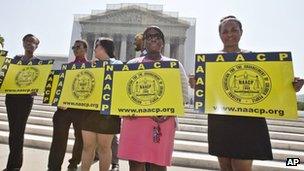Voting Rights Act's core quashed by US Supreme Court
- Published
Strict voting laws affect millions of Americans
The US Supreme Court has struck down a key part of a landmark civil rights-era electoral law designed to protect minority voters.
By a margin of 5-4, the justices quashed section 4 of the 1965 Voting Rights Act.
They ruled that an updated formula was needed to decide which jurisdictions' election laws need monitoring.
The law requires all or parts of 15 US states, mostly in the South, to receive federal approval for election changes.
'40-year-old' facts
The Voting Rights Act was extended for 25 years by Congress in 2006 with broad support.
"Congress did not use the record it compiled to shape a coverage formula grounded in current conditions," Chief Justice John Roberts wrote in the court's opinion, external.
"It instead re-enacted a formula based on 40-year-old facts having no logical relationship to the present day."
The justices did not go so far as to strike down section 5 of the law, known as the pre-clearance provision, which requires certain states to get federal approval before making election-law changes.
But since section 4, which sets the test for pre-clearance, has been found unconstitutional, the ruling effectively renders section 5 invalid until a new formula can be agreed by Congress.
Justice Ruth Bader Ginsburg, who was backed by three liberal-leaning colleagues, said in dissent that the court "errs egregiously by overriding Congress' decision".
Reading aloud her view to a packed courtroom in Washington DC, she said there could be no doubt that voter discrimination still existed.
"But the court today terminates the remedy that proved to be best suited to block that discrimination," she said.
Obama 'deeply disappointed'
President Barack Obama said he was "deeply disappointed" by the court's ruling, adding that the Voting Rights Act "helped secure the right to vote for millions of Americans".
"Today's decision invalidating one of its core provisions upsets decades of well-established practices that help make sure voting is fair, especially in places where voting discrimination has been historically prevalent," he said in a statement.
Shelby County, in the southern state of Alabama, launched the legal challenge. It argued that the pre-clearance process was out of date and an over-reach of federal power.
Critics of the voting law acknowledged that it may have been necessary in the 1960s, but they said times had changed and it was not longer appropriate to hold Southern states accountable for past wrongs.
Alabama Governor Robert Bentley told the Birmingham News, external the decision was "the most significant ruling" in his lifetime.
"Was there a reason to pass the Voting Rights Act 48 years ago? Yes, there was," Mr Bentley said. But he said "areas of discrimination" had been "addressed".
"As governor, I can assure you we're not going to have discrimination in the state of Alabama based on race, especially related to voting," he said.
The Voting Rights Act was intended to stop practices such as literacy tests, poll taxes or similar measures to keep black people from voting, in states with a history of racial discrimination.

Supporters of the Voting Rights Act say it is still relevant
Supporters of the provision say recent efforts to change election laws in some parts of the US, including a series of voter identification laws, underline the voting act's continued relevance.
2012 election blocks
Last year, the US justice department blocked changes to voter identification laws in the states of South Carolina and Texas.
And a federal court ruled that a plan to change the boundaries of congressional districts in Texas discriminated against the state's large and growing Hispanic population.
Activists in favour of preserving the law say that since the Voting Rights Act was renewed seven years ago, as many as 31 proposed changes to election laws have been blocked by Washington.
Last week, the US Supreme Court struck down a state law in Arizona that would have required registered voters to provide proof of citizenship at the polls.
Democrats say stricter voting laws, mainly championed by Republican legislatures, are designed to make it harder for minorities - who tend to vote Democratic - to cast their ballots.
- Published28 February 2013
- Published1 October 2012